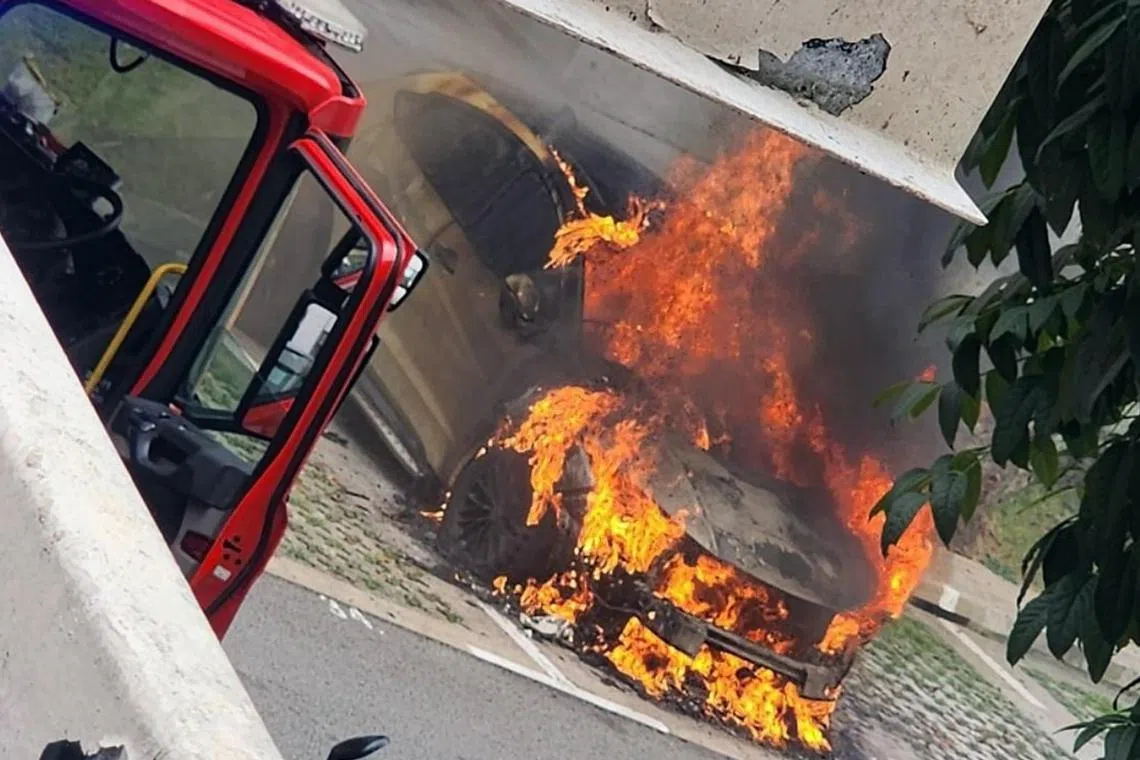askST: What should I do if my car catches fire?
Sign up now: Get ST's newsletters delivered to your inbox

A car caught fire at an outdoor carpark in Bukit Batok on the afternoon of Nov 17, 2024. It involved the engine of the car.
PHOTO: SCREENGRAB FROM FUAD ODEM/FACEBOOK
SINGAPORE - If you hear unusual sounds while driving, such as loud popping or banging noises from the exhaust, your vehicle may be in danger of catching fire, an expert said.
There were five reported cases an accident on Nicoll Highway on March 2
In its latest statistics report, the Singapore Civil Defence Force (SCDF) said there were 220 vehicle fires in 2024, up from 215 in 2023. Only one incident involved an electric vehicle (EV).
Here are some things you should know about vehicle fires.
Q. What are some common causes of such fires?
A: The primary cause of vehicle fires in Singapore is an ignition source, such as overheating and electrical faults within the vehicle. This can happen with electrical short circuits caused by defective or improper insulation, said a spokesman for the Automobile Association of Singapore (AAS), a motoring group offering roadside assistance.
“Vehicle fires (can also) occur due to leakage in the vehicle fuel system, where wear and tear or improper installation result in leakages of flammable fluids.
“As the vehicle contains flammable liquids as well as combustible materials, the fire can escalate quickly,” AAS said.
Vehicle accessories such as poorly installed sound systems and dashcams can start fires too, said Mr Teng Dao Xiong from 1 Car Service Workshop, adding that this can also happen if their cables are faulty.
Q. How can I tell if my vehicle is in danger of catching fire?
A. Do not drive the vehicle if you detect a burning smell, smoke or petrol, notice fluid leaks or a rapid drop in oil and coolant levels, AAS said. Other signs include unusual sounds, such as loud popping or banging noises from the exhaust.
Blown fuses and flickering signs due to electrical issues can also be signs of a problem, said Mr Teng.
He added that there might be a serious issue if the temperature gauge on the dashboard shows that the engine is overheating.
And if motorists notice that something is amiss while they are driving, they should pull over immediately and warn others by turning on the hazard lights, he said.
Q. What should I do if my vehicle catches fire?
A. If it is on fire, turn off the engine quickly, walk away from it and call emergency services (995) for assistance, said Mr Shaun Lee, general manager of Venture Cars.
SCDF said motorists should provide the make, model and registration number of the vehicle when placing the emergency call.
Mr Teng said motorists should stay at least 15m to 20m away from the fire and warn other road users by placing a warning triangle nearby, if they have one.
He warned against opening the car hood if the fire is in the engine compartment as it would expose the fire to more air, which could intensify the blaze.
Q. Do I follow the same steps if I have an EV?
A. Yes, said AAS, adding that EVs can show other signs of catching fire, such as audible popping and hissing from the battery compartment.
In a social media post on Feb 18, SCDF noted that fires involving EVs have a higher risk of re-ignition after the initial fire is extinguished due to their lithium ion batteries.
Q. How can I put out a fire in my vehicle?
A. For non-EVs, Mr Lee and SCDF suggested having an extinguisher to put out small fires. But leave big fires to the experts.
AAS recommended extinguishers with dry powder or foam.
The SCDF recommended that car owners place fire extinguishers in their vehicles for such emergencies, unless the car runs on an EV battery.
To use an extinguisher, SCDF suggested using the Pass method:
Pull out the safety pin
Aim the nozzle at the base of the fire
Squeeze the lever
Sweep the fire using the extinguisher’s discharge
Mr Teng suggested getting a small fire extinguisher that can be stowed under the driver’s seat for quick access.
Q. How do I prevent my car from overheating and catching fire?
A. Vehicle modification, especially when it involves the electrical or fuel systems, can increase the risk of a fire, said AAS. It recommended regular car servicing and a maintenance regime aligned with its manufacturer’s guidelines.
Mr Teng said leaks can be detected and fluid levels monitored during such servicing, adding that it is important to keep the engine bay clean as debris and oil build-up can start fires.
In its 2024 annual report, SCDF reminded vehicle owners to do regular visual self-checks on wiring, lights and other parts of the car.
Older vehicles can be more susceptible to fires, Mr Lee warned.
“For older cars, it is important to check the condition of the fuel line as a fuel leak onto hot surfaces is one of the most common causes of fire,” he said.
“While driving, frequently check for any warning indicators from the dashboard and refrain from driving at high speed over a prolonged period of time.”
This is due to the wear-and-tear and engine components being weaker in comparison to a new vehicle.
Q. Can I claim from my insurance policy for a vehicle fire?
A. It is likely claimable if the vehicle is on comprehensive or third party fire and theft coverage, said Mr Douglas Chia, chief executive of insurance brokerage eazy Insurance.
However, terms and conditions can be different across policies, he added.
A vehicle may not be covered in some instances, such as if it is proven that it is not an accidental fire.
Check if your policy includes coverage for fire and flood damage as these can sometimes be treated separately, AAS said.
If the fire started as a result of an accident or suddenly while driving, it is likely that insurance will cover it, said Mr Chia.
He added that there is no difference in the treatment of an EV or internal combustion engine car with regard to fire.
He said that investigations will be carried out and once the insurer has done the assessment, compensation will be given to the insured for the market value of the damaged vehicle.
“Once the insurer has done the assessment, they will compensate the insured for the market value of the car. The out-of-pocket portion will be the excess, which the insured will have to bear for the loss,” Mr Chia said.
He noted that the SCDF responds to almost all vehicle fire cases and insurers will wait for its report, which might detail the cause of the fire.
This would add to the insurers’ own investigations related to each claim and a claim would be straightforward if no foul play is suspected.



